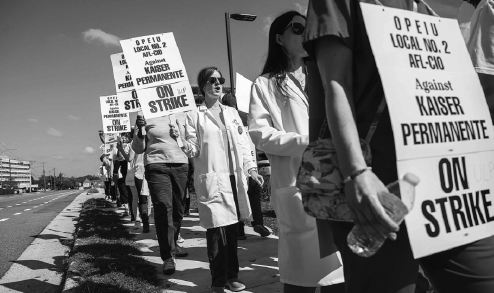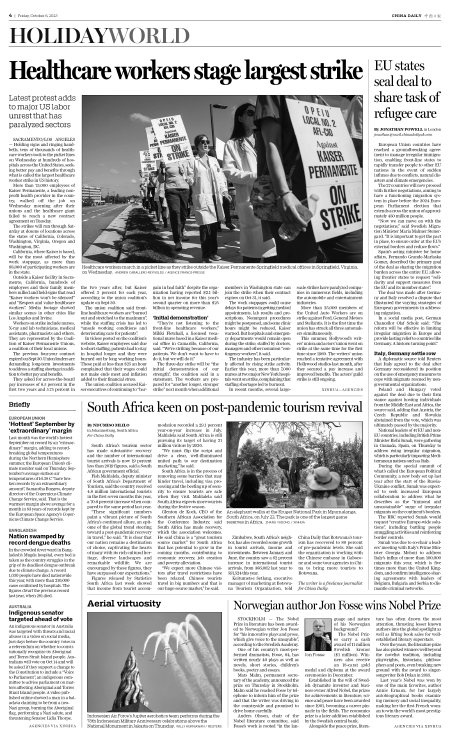
Healthcare workers march in a picket line as they strike outside the Kaiser Permanente Springfield medical offices in Springfield, Virginia, on Wednesday.
SACRAMENTO/LOS ANGELES — Holding signs and ringing handbells, tens of thousands of healthcare workers took to the picket lines on Wednesday at hundreds of hospitals across the United States, seeking better pay and benefits through what is called the largest healthcare worker strike in US history.
More than 75,000 employees of Kaiser Permanente, a leading nonprofit health provider in the country, walked off the job on Wednesday morning after their unions and the healthcare giant failed to reach a new contract agreement on Tuesday.
The strikes will run through Saturday at dozens of locations across the states of California, Colorado, Washington, Virginia, Oregon and Washington, DC.
California, where Kaiser is based, will be the most affected by the work stoppage, as more than 68,000 of participating workers are in the state.
Outside a Kaiser facility in Sacramento, California, hundreds of employees and their family members rallied and held signs that read "Kaiser workers won't be silenced "and "Respect and value healthcare workers". Media footage showed similar scenes in other cities like Los Angeles and Irvine.
Workers on strike include nurses, X-ray and lab technicians, medical assistants, pharmacists and others. They are represented by the Coalition of Kaiser Permanente Unions, a coalition of their local unions.
The previous four-year contract expired on Sept 30. Union leaders are demanding long-term investments to address a staffing shortage in addition to better pay and benefits.
They asked for across-the-board pay increases of 6.5 percent in the first two years and 5.75 percent in the two years after, but Kaiser offered 3 percent for each year, according to the union coalition's update on Sept 30.
The union coalition said frontline healthcare workers are "burned out and stretched to the maximum", while the staffing crisis has led to "unsafe working conditions and deteriorating care for patients".
In videos posted on the coalition's website, Kaiser employees said due to short staffing, patients had to stay in hospital longer and they were burned out by long working hours. Those paid at less than $25 an hour complained that their wages could not make ends meet and inflation added to their financial stress.
The union coalition accused Kaiser executives of continuing to "bargain in bad faith" despite the organization having reported $2.1 billion in net income for this year's second quarter on more than $25 billion in operating revenue.
'Initial demonstration'
"They're not listening to the front-line healthcare workers," Mikki Fletchall, a licensed vocational nurse based in a Kaiser medical office in Camarillo, California, said. "We're striking because of our patients. We don't want to have to do it, but we will do it."
The three-day strike will be "the initial demonstration of our strength", the coalition said in a statement. The workers are prepared for "another longer, stronger strike" next month when additional members in Washington state can join the strike when their contract expires on Oct 31, it said.
The work stoppages could cause delays for patients in getting medical appointments, lab results and prescriptions. Nonurgent procedures might be postponed, and some clinic hours might be reduced, Kaiser warned. But hospitals and emergency departments would remain open during the strike, staffed by doctors, managers and other nonunion "contingency workers", it said.
The industry has been particularly affected by rising strike activity. Earlier this year, more than 7,000 nurses at two major New York hospitals went on strike, complaining that staffing shortages led to burnout.
In recent months, several large-scale strikes have paralyzed companies in numerous fields, including the automobile and entertainment industries.
More than 25,000 members of the United Auto Workers are on strike against Ford, General Motors and Stellantis. It is the first time the union has struck all three automakers simultaneously.
This summer, Hollywood's writers' union and actors' union went on strike at the same time for the first time since 1960. The writers' union reached a tentative agreement with Hollywood studios last month, after they secured a pay increase and improved benefits. The actors' guild strike is still ongoing.

